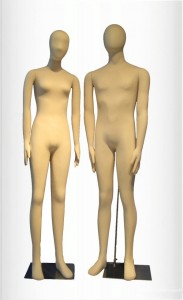A University of Liverpool study finds that the average female mannequin used to display clothing at British fast fashion stores closely mirrors the body type of a severely underweight woman, which can have serious implications on public perceptions of “ideal” body types.
 Researchers looked at 17 fashion retailers across two British cities and assessed the body size of male and female mannequins, rating each figure on two scales: one based on body mass index (BMI), and the other on visual perception. (Because brands didn’t let them inspect the figures directly, the team had to rely on solely visuals to carry out their research, BBC reported.)
Researchers looked at 17 fashion retailers across two British cities and assessed the body size of male and female mannequins, rating each figure on two scales: one based on body mass index (BMI), and the other on visual perception. (Because brands didn’t let them inspect the figures directly, the team had to rely on solely visuals to carry out their research, BBC reported.)
Their findings, published in the Journal Of Eating Disorders, indicated that a higher proportion of the female-bodied mannequins reviewed were “underweight,” according to these standards. The male-bodied mannequins were significantly larger than the average counterparts. Every one of the 32 female-bodied mannequins assessed throughout the data collection was underweight, compared to only 8% of the 26 male-bodied ones that researchers looked at.
Not only was there a lack of diversity of body size among the female-bodied mannequins, but researchers concluded that the figures’ frames would be considered “medically unhealthy” on a real person. “Our survey of these two high streets in the UK produced consistent result: The body size of female mannequins represented that of extremely underweight human women,” Dr. Eric Robinson, who led the study by the University of Liverpool’s Institute of Psychology, Health, and Society, told Science Daily.
Changing the size of the mannequins wouldn’t “solve young people’s body image problems, he admitted, but underweight-seeming figures likely perpetuate society’s existing body ideals – and should therefore be curbed.”Because ultra-thin ideals encourage the development of body image problems in young people, we need to change the environment to reduce emphasis on the value of extreme thinness,” Robinson told Science Daily.
The “presentation of ultra-thin female bodies” in the form of mannequins, the researcher added, “is likely to reinforce inappropriate and unobtainable body ideals, so as a society we should be taking measures to stop this type of reinforcement.”
The study’s findings are agreeable with a string of complaints that have come out of the U.K. in regards to the ultra-thin look of mannequins used in stores: Various British retailers have received criticism, especially on social media, in recent years for the unrealistic body types put forth with their displays.